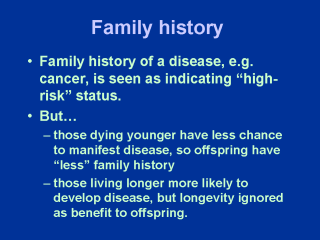| front |1 |2 |3 |4 |5 |6 |7 |8 |9 |10 |11 |12 |13 |14 |15 |16 |17 |18 |19 |20 |21 |22 |23 |review |
 |
An example of how
problematic things can become is when you think about family history of prostate cancer,
for example. 100 years ago, prostate cancer was not a problem among Chinese men. Few lived
long enough to develop the disease because they were largely victims of war, pestilence,
or famine. So most Chinese men have no family history of prostate cancer. But some men did
survive, and live to be in their 80’s and 90’s. These men are more likely to have some
advantage, genetically speaking, that enabled them to live so long (or maybe they were
just lucky to avoid a bullet). However, by the time they reach 80, many will have some
cancerous cells in the prostate, some will be diagnosed as having prostate cancer, and so
their sons will have “a family history” of prostate cancer. If you have a family history, you are considered to be at greater risk of the disease because it is assumed there is a genetic basis- (which of course there is to every disease). However, no family history records the positive, advantageous aspects of the grandfather’s phenotype. That of longevity (genes+environment+lifestyle), or survival genes (genes+environment+lifestyle), or others (genes+environment+lifestyle). So the record is of undesirable, but not of desirable traits. Is this an argument for more precise genetic profiling? No, because, while there will be some factors which relate to genotype, the penetrance of the genes varies so much as a result of other genes, environment and lifestyle influences that the most common conditions, those that take the bulk of medical time and expense, will be indistinguishable without considering all the environmental issues, and trying to track those down in combination with the range of normal genetic diversity will make deciphering the genome like learning the 2 times table in comparison to the task that is involved. The benefits are unlikely to justify the effort involved. |
| front |1 |2 |3 |4 |5 |6 |7 |8 |9 |10 |11 |12 |13 |14 |15 |16 |17 |18 |19 |20 |21 |22 |23 |review |